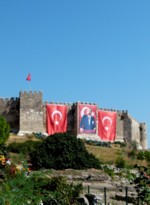Kuşadası
Kuşadası is a half hour drive from Selçuk, on quite a good road, peppered with speed cameras. It has an attractive Corniche and a variety of markets from: 'designer' outlets to a large tourist trap near the port.
Kuşadası in 1988 (top left) and now
I was here on a cruise ship in 1988 when I took the (older) photo above. While most of Ephesus from that trip remained quite familiar, I found Kuşadası almost unrecognisable.
One thing I did remember was buying 'Lacoste' or 'low-cost' T-shirts in Kuşadası that lasted quite well. So history repeats itself, as you can see if you look carefully in Ephesus above.
And markets being markets we had to make a second trip from Selçuk, on our way to Pamukkale.

